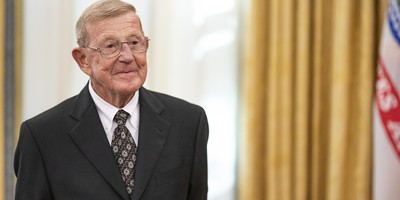We weep for Eli Wiesel in his life. We mourn the loss of a man who lived the future in his past, fate and fame fused and burned permanently into the memory of a civilization that inflicted great suffering.
We weep for Eli Wiesel in death, a man who in life transcended the evil and horror of his time, a witness who testified with a quiet voice that nevertheless thundered like the voice of a prophet from the Holy Bible. He looked back with outrage to show that one man can make a difference in how the rest of us remember great tragedy.
We weep for Eli Wiesel as we read about his life and death, told between the headlines of evil continuing to strut across the globe. He fought to make the world see with clarity what the Nazis and their sympathizers did in killing six million Jews. He pulled evil from its hiding place behind the curtains of obfuscation. His face was carved with deep furrows, as though by the hand of a great artist, giving us a glimpse of the sorrow in his soul to enable future generations to understand the human capacity to survive through the brutal and the benign.
In his books and memoirs he describes his experience in hell, a death camp where his mother and one of his sisters were murdered. But there was an ordinary life the rest of us could not see. Elijah, his grandson, shared in his eulogy how he and his grandfather made English muffins slathered with blueberry jam.
Wiesel's life was not of the imagination, but of reality. I keep his books on a shelf next to a copy of Dante's "Inferno" to remind myself of the difference between experienced cruelty and imagined hell. When the last survivors of the Holocaust die it will be difficult for some people to believe that such things actually happened. Wiesel leaves his works to help them remember.
Recommended
The Holocaust is already ancient history for generations being born, for the young passing through the memorials and past the monuments, and even for the teenagers assigned to read "Night," his autobiographical description of life in the death camp. He understood the human capacity to forget, which is why he never shut up when he confronted injustice. He knew that books, speeches and articles no longer have the capacity they once did to move men and women to understand the evil that man does. He knew that to remain silent under any condition is evil, too. He did not endure the pain as "second nature," but as nature itself, and in his tragic melancholy he sought and found the moral message.
"Was it yesterday -- or long ago -- that we learned how human beings have been able to attain perfection in cruelty?" he asked in "Open Heart," reflections on mortality at the age of 82. He wrote: "That for the killers, the torturers, it is normal, thus human, to act inhumanely? Should one therefore turn away from humanity. The answer, of course, is up to each of us. We must choose between the violence of adults and the smiles of children, between the ugliness of hate and the will to oppose it."
His questions were specific as they applied to the Holocaust, and he made crucial the study of the murder of the Jews across Europe, where Big Authorities ordered the evil and little authorities assuaged their guilt by asserting they were only "following orders." As for the Others, he exposed the rationalization of silence and the participation through greed, taking the spoils left behind by Jews on their way to their deaths.
Wiesel had a mellifluous tongue. He was a wordsmith, an alchemist, who crafted golden phrases from leaden experience, such as, "Never shall I forget the little faces of the children whose bodies I saw turned into wreaths of smoke beneath a silent blue sky." He did not sweeten his prose with the charm of anecdote, as in "The Diary of Anne Frank," but rather offered an eloquence of hope to endure and go forth in the face of outrageous cruelty. "Where Anne Frank's book ends," he wrote, "mine begins."
An obituary in the newspaper marks a life, leaving the rest of us to remember the deeds and words of a man who knew how to inform and inspire the generations that follow. We live our lives in the business and busyness of the moment, debating events and ideas and enjoying the trivia of smaller moments. But we should stop to contemplate and alleviate the suffering of others where we can. Elie Wiesel was the phoenix rising anew from the ashes of darkness at doom. Remembering his life inspires us all to try harder to be better people.

























Join the conversation as a VIP Member